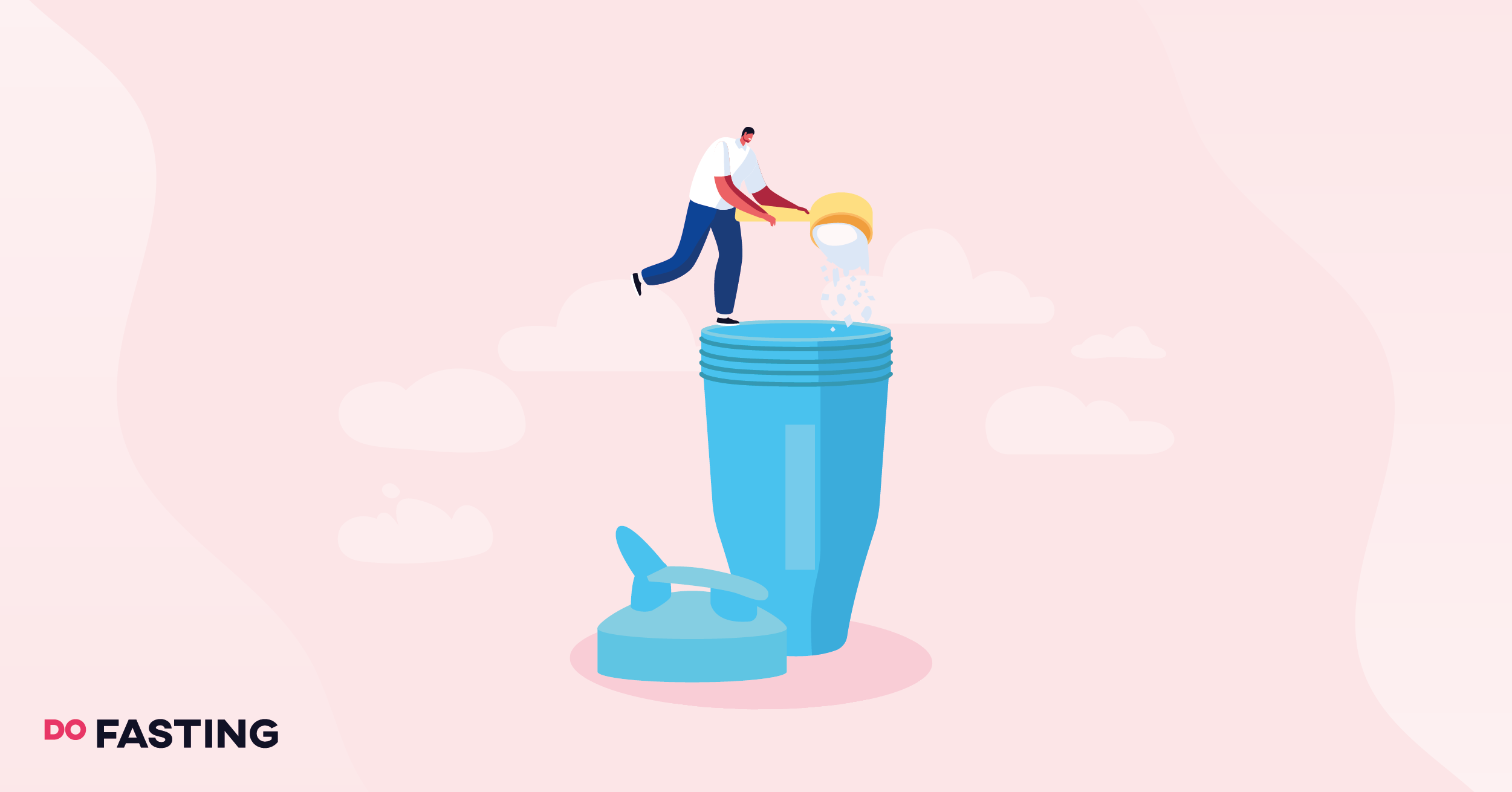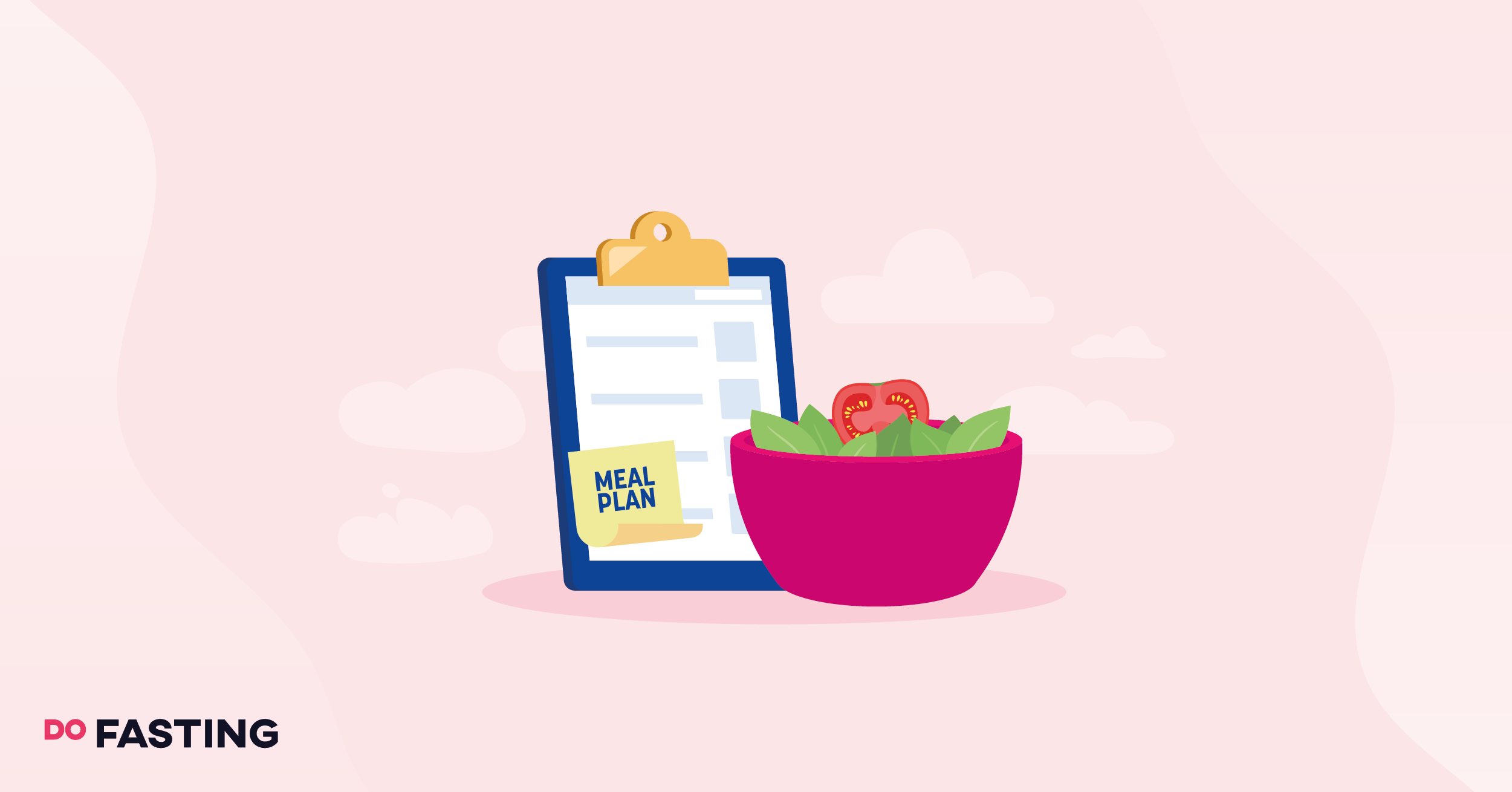Contents
Can You Take Supplements During Fasting Period?
Though the intermittent fasting method does work based on an eating window balanced by a fasting routine to burn body fat and lose weight, you still need to include essential nutrients in your diet.
But you might be wondering, based on the necessary calorie deficit that supports the metabolic switch to ketosis during an intermittent fasting diet— do supplements break a fast?
While there are some dietary supplements that can contain enough calories to break your fast, plenty of options still remain as products that you can safely take on an empty stomach.
Additionally, certain supplements should actually be taken with food to enhance their efficacy, which can take place during an eating window!
But don’t worry— we are about to break down all the aspects of taking supplements while intermittent fasting, which to take, and when to take them.
Plus, that is all while still losing weight and burning fat to your maximum potential, as well as reaping the health benefits that come with well-supplemented intermittent fasting.
Take a
1-minute quiz
and discover how much weight you can lose with DoFasting!

What Kind of Supplements Can You Take?
Vitamins and minerals are essential to a healthy and functional body, brain, and metabolic and nervous system, among other vital processes.
And it’s true that these nutrients generally come from healthy foods and a balanced diet. As such, the vitamins, essential micronutrients, and electrolytes for your body are typically found in a range of foods like vegetables, fruits, meat, whole grains, healthy fats, and more.
But when you are fasting, no such foods are being consumed as you focus on enhancing your metabolism and fat-burning abilities, not only to aid weight loss, but also for a wide range of benefits like lower insulin levels and better cardiovascular health.
Thus, even when intermittent fasting, supplements are essential to keep your nutrient levels attuned without using food to provide them. And the answer is dietary supplements that you can safely take while intermittent fasting, either during an eating window or a fasting period.
So, what kinds of supplements should you take for intermittent fasting? Multivitamins, minerals, and omega-3s are all essential, as well as individual micronutrients and electrolytes for fasting. Probiotic supplements and healthy oils are also necessary.
Take a
1-minute quiz
and discover how much weight you can lose with DoFasting!

When Should You Take the Supplements?
Depending on the type of supplement in question, you might need to take it with food to prevent an upset stomach or poor absorption. Alternatively, a few supplements are acceptable to eat on their own— it all depends on the supplement compound.
To avoid any illnesses and promote the best possible fasting experience, read on for a comprehensive list of supplements you should and should not take during a fasting window.
Supplements You Should Take With Food
Regardless of your diet, many supplements cannot be taken during a fasting window or on an empty stomach. You need to eat them with food, which means scheduling eating windows around your nutritional needs.
But why should some supplements only be taken with food? Well, the simple answer is that certain supplements and vitamins contain enough fats, protein, or calories that they break your fast, pushing your body out of metabolic ketosis and a state of fat loss.
Additionally, many supplements are too difficult for your body to absorb and digest without meals accompanying them, like vitamin E with fat-soluble ingredients that require a full stomach.
You should avoid the following supplements while in a fasted state.
Magnesium
Magnesium is important for your brain health and the hormonal signals throughout your body. It also helps control your nervous system and muscles, but because it’s more difficult for your body to digest without food, magnesium is not taken during fasting.
Zinc or Copper
Both are essential minerals for your body to function optimally in regards to your immune system, metabolic functions, and vascular wellness. In particular, zinc can have a very positive effect on your mood.
Curcumin or Turmeric
Curcumin is part of the turmeric compound, and they work to lower inflammation in the body and reduce your resistant insulin levels, helping you enter ketosis when taken before fasting begins.
Krill Oil or Omega Krill Complex
These are types of natural omega-3 fatty acids that support the metabolism and even the effectiveness of ketosis, but are much easier to digest when consumed with meals.
Kelp Powder or Potassium Iodide
Things like potassium, sodium, and calcium are all electrolytes for fasting and critical minerals for your body to function. Kelp powder and potassium iodide supplements are particularly good sources of natural electrolytes, but absorb better with food.
Fat-Soluble Vitamins
Any vitamins that are fat-soluble need to be eaten with a meal that contains other healthy fats to actually absorb and digest them. Such formulas include vitamins A, E, and K, and vitamin D.
Amino Acid or Amino Acid Combinations
Amino acids and their combinations are very important for your diet, as they allow your muscles to repair and grow themselves. This includes branched-chain amino acids or BCAAs. But do BCAAs break a fast?
Yes— because they naturally include both protein and carbohydrate contents, coming from rich dietary sources like dairy and fish, they will break a fast.
Fatty Acids
Similar to krill oil or complexes, any omega-3 fatty acids or medium-chain triglycerides like MCT oil is pure fat compound. As such, these also break your fast due to the calories contained.
Protein Powders
Though protein powders are great for pre-workout sessions, they contain enough calories and high protein levels to get an insulin response out of your body, and interrupt intermittent fasting windows.
Sweetened Electrolyte Drink Powders or Effervescent Tablets
Such sports drinks can really help refresh your body during physical activity, but the sugar levels contained in electrolyte powders or tablets similarly evoke an insulin response and will push your body out of fasting and ketosis.
Sweetened Gummy or Chewable Supplements
While the supplement or vitamin compounds themselves might not be damaging to your fast, the artificial sweeteners that most companies use to make these products taste good spike glucose levels too high.
Supplements With Additives
In general, anything with additives or sugar, including fruit juice, cane sugar, or even starch components will disrupt your fast and state of weight loss by raising insulin levels, so avoid them when restricting calories.
Supplements You Can Take While Fasting
And finally, there are several supplements that can be taken without eating a meal either beforehand or accompanying the supplement.
Because these dietary supplements do not contain enough calories, sugar, or pure fat to affect your body’s fat-burning state of ketosis, they are safe to take without worrying about being able to still burn fat.
In fact, many supplements actively promote ketosis and help reduce any side effects you might feel as your metabolism switches to burning fat instead of glucose when fasting.
Plus, such compounds are not difficult to digest, and will not make you feel ill even when taken on an empty stomach! So, feel free to implement the following products into your intermittent fasting window— with a zero-calorie beverage, of course!
DoFasting Appetite Suppressant
One of the best things to supplement your intermittent fasting diet with is an all-natural appetite suppressant that still contains essential compounds for energy and wellness. And the DoFasting Essential Fiber Complex is perfect for fasting situations.
This supplement also contains all-natural cellulose and glucomannan that help you break through hunger pangs and cravings between meals, making fasting periods easier to achieve.
DoFasting Apple Cider Vinegar Gummies
Unlike other gummy supplement formulas, DoFasting Apple Cider Gummies do not contain artificial sweeteners or sugar that will disrupt your fasting cycle.
Instead, you can safely eat these without food, on an empty stomach, and get all the benefits of vitamins B6, B12, folic acid, and more.
Iron
Taking an iron supplement is good for preventing anemia as well as enhancing your digestive and gastrointestinal systems, regulating body temperature, and overall energy levels. Plus, taking iron does not break your fast!
L-Tyrosine
L-tyrosine is essential for your brain’s processes during intermittent fasting— it releases adrenaline for mental clarity, dopamine for mood balancing, and norepinephrine for stress recovery, so taking it mid-fast is very helpful for your health.
Folic Acid
This compound is complex and governs the body’s response to folate deficiencies, as well as levels of homocysteine in the blood. Additionally, folic acid promotes better cognitive focus and clarity.
Probiotics
Probiotic supplements are responsible for regulating the healthy bacteria in your gut and your entire gastrointestinal system. A good probiotic supplement will still contain the balanced amino acids necessary for digestion, without having to be taken when you eat.
Vitamin B and Vitamin C
As water-soluble compounds, vitamin C and any B-complex vitamins are safe to be taken while fasting. Just make sure you consume them with plenty of water to aid in digestion.
Take a
1-minute quiz
and discover how much weight you can lose with DoFasting!

Conclusion
Even while intermittent fasting, it’s important to get your daily requirement when it comes to vitamins, minerals, and other essentials.
In fact, it is especially key to your overall health to continue maintaining nutrient levels while fasting, as the calorie deficit you experience precludes you from gaining vitamins from eating a meal!
As such, there are certain supplements that you can take during fasting and others that are best consumed with food. And hopefully, this handy guide has helped you figure out which is which!
See how DoFasting will improve your life
Find out what works for you with this 60-sec quiz approved by our experts and get your personal revolutionary fasting assistant.
Start the Quiz














